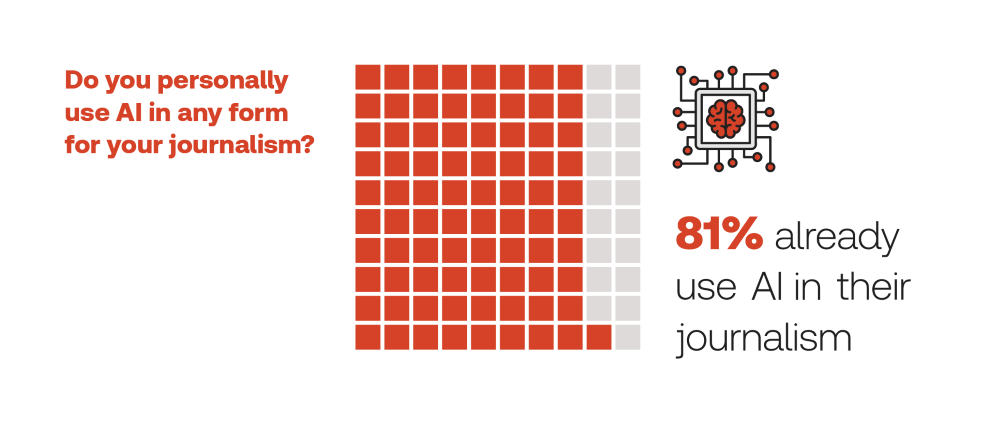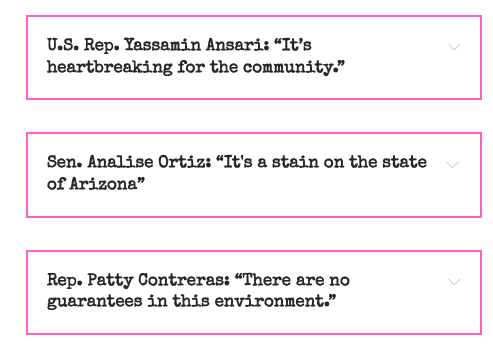
Can AI do journalism?
The robot reporter debate … Michael Whiting gets weirder … And gosh darn it, we sure do hate Trump.
The past few decades have felt like a neverending bloodbath in the journalism industry.
News outlets big and small have been gutted by lost revenue. Every few months, an outlet announces another round of newsroom layoffs. Trust in news organizations is down, and the people in charge don’t seem to know how to fix it all.
Now, there’s a shiny new tool that promises to “do more with less” and maybe bring the industry back to its former glory.
If you’ve been reading our new weekly, the A.I. Agenda, you probably know where this is headed. AI has a lot of potential to make newsrooms faster, stronger and smarter. AI can research and crunch numbers faster than humans and ease the mind-numbing labor of transcribing public meetings.1
There’s a real risk that AI-generated news will become a cheap, ubiquitous replacement for real journalism — but can journalists’ core responsibility to ask tough questions, pick up on nuance and push back against power be outsourced to a machine?

You may notice that our art intern, ChatGPT, is finally learning how to spell. Six months ago, it would have spelled newsletter four different and incorrect ways.Since generative AI came on the scene several years ago, the news industry has seen its share of scandals:
Last week, the LA Times launched its AI “Insights” app that summarizes news stories. Within days, it caused quite a controversy when it summarized an article about the Ku Klux Klan with very fuzzy language that sounded a lot like AI was sympathizing with the hate group.
Sports Illustrated was busted two years ago for running stories and photos that were generated by AI. Even the authors of the stories were made up by AI and used AI-generated profile photos. The publication denied that any stories were written by AI, although they removed the fake authors from their website.
A Wyoming reporter was caught last August using AI to make up quotes from the state governor and a local prosecutor.
In December, Apple launched an AI feature that helped summarize news articles for users, which had to be recalled because it started manufacturing stories like claiming that Luigi Mangione had shot himself.
That’s a lot to take in. So today we’re exploring AI from the lens of a newsroom — including our own.
But first, let’s start by looking at all the places AI is currently used in journalism. AI is already a tireless research assistant, crunching massive datasets to uncover trends, drafting initial versions of stories (because even journalists love a good rough draft), whipping up visuals and videos and translating content.
In fact, a Thomson Reuters Foundation survey revealed that over 81% of 200 journalists across 70 countries are already using AI tools somewhere in their editorial pipeline.
We’ve been thinking a lot about AI lately, in part because we use a lot of AI features within Skywolf, our legislation-tracking service. An AI model summarizes all the bills introduced at the Arizona Legislature, and a veteran human bill summarizer reviews and improves that summary before it’s published. Then she trains the model so it can do a better job next time.
So when we show you a Skywolf bill summary, that’s already based on an AI-generated, human-reviewed snippet of work.
But where are the redlines? Where’s the balance between utilizing AI for better, faster, more accurate journalism, and just getting lazy and handing our responsibilities over to the robots?
The journalism industry hasn’t quite answered those questions yet.
Big News Ethics
While major publications have taken steps to address the ethics of AI, many of their policies are surprisingly vague and often feel like placeholders rather than concrete guidelines.
And many of those policies were written years ago, when AI tools like ChatGPT were first coming onto the scene.
The Washington Post, for example, touts transparency about its AI use, but stops short of outlining exactly how or when disclosure occurs. It’s AI policy says:
We are transparent about how and when we use AI
We allow AI to suggest related content, to translate between languages, or to sift through pages of documents or thousands of images
We will not employ AI to generate images, video or visual works that purport to represent reality without disclosing its use
We believe in the value of our intellectual property and will protect the integrity of our work wherever it is used
The Associated Press treads cautiously, acknowledging AI's potential, yet hedging with terms like “experiment with caution“ and “benefit the mission.” The AP explicitly discourages using tools like ChatGPT for publishing, but there's no clarity on oversight or enforcement.
AP staff may experiment with ChatGPT with caution, they do not use it to create publishable content
Any output from a generative AI tool should be treated as unvetted source material
AP does not allow the use of generative AI to add or subtract any elements from photos, or videos
AP urges staff not to put any sensitive materials into AI tools
The New York Times and others proudly emphasize human expertise, essentially declaring "machines can't replace judgment," which sounds comforting but sidesteps the real issues of when and how to use AI.
Generative AI can assist our journalists in uncovering the truth
The expertise and judgment of our journalists are competitive advantages that machines simply can’t match
The first principles of journalism should apply just as forcefully when machines are involved
Tech publication Wired offers one of the more detailed policies, which explicitly prohibits AI-generated — and AI-edited — content.
No using AI generated photos to support stock photos
No publishing stories with text generated by AI
No publishing text edited by AI
AI can be used to suggest headlines or social media posts
AI can be used to research topics
Artists may use AI to spark inspiration
This week, the Agenda set out to draft our own AI ethics policy. But we quickly found that, like many of the big national outlets, we’re still not sure where we land.
So we’re trying a different approach…
To read about how the Agendaverse is approaching AI, and watch us argue about it in real-time, click over to the A.I. Agenda.
Today’s edition of the A.I Agenda explores how the Agenda will use — and not use — AI tools as we continue to innovate local, independent journalism.
And while you’re there, don’t forget to fill out the A.I. Agenda survey to tell us how you think journalists should use AI — and how you’re using AI in your life.
Investigating the investigators: Daryl Greer, the lead investigator under former Apache County Attorney Michael Whiting, was sentenced to one year of probation after admitting at a court hearing that he investigated Whiting’s wife’s challenger for county school superintendent and threatened the challenger with arrest if he didn’t end his campaign, the Republic’s Robert Anglen and Elena Santa Cruz report. Whiting and Greer allegedly sent the superintendent candidate a withdrawal form and photos of his car and properties. The revelation came as part of an ongoing corruption case against Whiting and his wife for misusing public money, theft and fudging public records.
SEAL Team Six: U.S. Navy SEALs are infiltrating Congress. Six former members, including Arizona Republican U.S. Rep. Eli Crane, currently serve in the U.S. House and Senate, and all of them have ties to the MAGA movement, per Politico. That means over 1% of Congress is comprised of former SEALs, a large overrepresentation of the special forces that are embracing a “combative style of politics — one that favors partisan warfare, legislative brinksmanship and an open embrace of Trump.”
We have fewer reporters keeping this organization running than former U.S. Navy SEALs serving in Congress. Your paid subscriptions will help us keep growing.
Got a warrant?: After Trump rescinded a longstanding policy prohibiting immigration enforcement at schools, Arizona Attorney General Kris Mayes told K-12 schools and colleges that in most cases, they don’t have to let immigration officers on school grounds, per the Republic’s Madeleine Parrish and Helen Rummel. Mayes told schools they should ask for a warrant and avoid releasing students’ personally identifiable information without a subpoena.
Priorities: The Trump administration’s federal cuts could cost Arizona’s university researchers $812 million for 720 grants to research things like engineering, cancer and Alzheimer’s disease because they mention DEI keywords, Cronkite News’ Sammy Travis reports. Meanwhile, Republican Senate President Warren Petersen is meeting with Trump cabinet members in D.C. this week to talk Arizona issues like gas prices, air quality and water security, KTAR’s David Veenstra writes.
SNL skits last forever: Victims' rights advocate Kayleigh Kozak issued her second lawsuit bashing Maricopa County Attorney Rachel Mitchell in the past six months, per the Phoenix New Times’ Stephen Lemons. Mitchell was involved in giving a plea deal to a soccer coach who abused Kozak when she was 12, and Kozak is suing the county attorney’s office to comply with a records request for the 2006 prosecution of that soccer coach. The two have been publicly beefing for a long time, and Kozak lobbed barbs at Mitchell in the new public records case for her role in Supreme Court Justice Brett Kavanaugh’s confirmation hearing that SNL parodied.
The response: In case you missed it, we collabed with LOOKOUT on a story about how LGBTQ+ advocacy looks different at the state Capitol this year in a hostile political climate. LOOKOUT asked three prominent Democratic Arizona lawmakers how they plan to support the community.
For Democrats in Congress, cursing to show how much they dislike Donald Trump and Elon Musk has become all the rage, per Politico.
“(T)he breadth of swearing is unmistakable, newly fashionable among members of a party in the wilderness who are looking for shortcuts to authenticity to channel voters’ rage,” Politico writes.
Here’s our absolute favorite example of Democrats getting tough on Trump by breaking out the naughty words.
But U.S. Sen. Ruben Gallego tells Politico that he’s an OG swear-word-user.
“I mean, I was swearing before Trump, so I can’t really blame it on him,” Gallego told Politico. “I’m gonna blame it more on being in the Marines for as long as I was.”
Before AI took his job, Hank once spent about six months doing transcription as his main gig. It was the most tedious job he ever had, but it paid the bills.
















Yes to the above but i decided to check out the extra info because i am obsessed with my own negativity about AI which i think steals jobs, allows rapacious capitalism to deepen and writes horrendously all while bringing our world to an overheated end from the energy it consumes. Thats a bias i probably ought to inform myself about a bit more....
Anyone else tired of seeing and hearing about AI? If it is unobtrusive and does grunt work...use it. If not...don't. Chump is meeting with a bunch of business honchos today or tomorrow. This is their opportunity to school him on his folly.